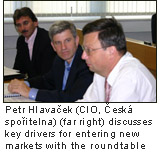
|
|
|
 |
|
 |
Conducting Business in Emerging Markets
Thought Leadership Roundtable on Digital Strategies September 26, 2006 - Prague, Czech Republic hosted by Ceská sporitelna CIOs and other senior execs from Cargill, Ceská sporitelna, Cisco, DHL, Erste Bank, GM, Hasbro, Henkel, IBM, and Škoda Auto were joined by academics from Tuck and Michigan and partners from AT Kearney and Egon Zehnder for this roundtable. |
||
|
Press Release
Agenda
List of Participants
Discussion Guide
Overview Article
|
|||||
Regardless of the driving factors, all companies face similar market-related issues as they enter or expand their businesses or relationships in emerging markets: unfamiliar cultures, varied infrastructure, historically different approaches to business, and more rapid growth and change.
In this roundtable we discussed how companies can best approach opportunities to do business in emerging markets, with a specific focus on Central and Eastern Europe. The participants' experiences and views yielded the following insights (see the Overview Article for a complete summary):
- Emerging markets should be viewed in the context of a broader global strategy, with an eye toward developing regional markets and capabilities ahead of the competition. A stepping-stone approach to emerging markets can reduce risk and accelerate learning.
- Companies that build a presence early, take a long term view, and are therefore prepared when opportunity knocks, end up faring best in emerging markets.
- A separate emerging market business unit can help accelerate market development. Emerging market organizations may not be able to build momentum or gain market share quickly and effectively in the shadow of larger, mature operations.
- With acquisitions or young organizations, many global standards and benchmarks should be phased in gradually—take time to first understand (and perhaps learn from) local standards and incentives.
- Focus on recruiting and retaining local management, building labor relationships (and related community and government relationships), and cross-pollinating managers within emerging regions to build trust and bridge cultural differences.
- When setting up regional shared services operations in emerging markets, consider overall risk, infrastructure quality, and cultural compatibility, not just potential labor cost savings.
The evening before the roundtable Ceská sporitelna Chairman and CEO Jack Stack hosted a dinner for the participants. After dinner, Martin Jahn, Chief HR Officer of Škoda Auto and former Deputy Prime Minister for Economic Policy of the Czech Republic, gave a presentation on the economic and investment development of the Czech Republic.
![]()
| Visit the center's wiki from the POMS conference on Supply Chains in Emerging Markets | |
| Supply Chain Excellence in Emerging Economies, Hau Y. Lee and Chung-Yee Lee, eds. - features two papers by M. Eric Johnson, "Building a Distribution System in Eastern Europe" and "Dual Sourcing Strategies" | |
| "Managing the Organizational Impact of Global Operations" - A Thought Leadership Roundtable on Digital Strategies | |